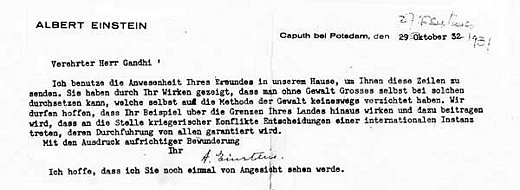
Generations to come, will scarce believe, that such a man as this one, ever in flesh and blood walked upon this earth. This was said of Mahatma Gandhi by Albert Einstein on the former's 70th birthday in 1939.
Einstein was deeply inspired by Gandhi's teachings and so much so that he called him the most enlightened of all the politicians of his time. The two never met but they exchanged letters among themselves. In other words, they were pen pals.
In 1950, two years after Gandhi's death, Einstein recorded an interview for United Nations from his study at Princeton University in New Jersey.
He said, "We should strive to do things in his spirit...Not to use violence in fighting for our cause, but by non-participation in what we believe is evil."
 |
| Gandhi's picture framed in Einstein's study |
On that radio interview, Einstein advocated for non-cooperation, a peaceful form of protest against what you believe is evil. Such a movement was launched by Gandhi in 1920s.
Einstein believed that if the world were to be improved, it could not be done simply with new scientific discoveries, it also had to encompass morals and ideals.
"In this respect I feel," Einstein said: "That the Churches have much guilt. She has always allied herself with those who rule, who have political power, and more often than not, at the expense of peace and humanity as a whole."
Einstein noted that the admiration for Mahatma Gandhi in all countries of the world rests on recognition of the fact that in time of utter moral decadence, Gandhi was perhaps the only statesman to stand for a higher level of human relationship in political sphere.
Their communication began through letters. Einstein wrote the following congratulatory letter to Gandhi in the 1930s (this was after their renowned Salt March from Sabarmati Ashram to Dandi).

Translation:
"I use the presence of your friend in our home to send you these lines. You have shown through your works, that it is possible to succeed without violence even with those who have not discarded the method of violence.
We may hope that your example will spread beyond the borders of your country, and will help to establish an international authority, respected by all, that will take decisions and replace war conflicts.
P.S. I hope that I will be able to meet you face to face some day."
Gandhi responded, saying: "Dear friend, I was delighted to have your beautiful letter sent through Sundaram. It is a great consolation to me that the work I am doing finds favour in your sight. I do indeed wish that we could meet face to face and that too in India at my Ashram."
Despite their intentions, the two greats never met in person.
On Gandhi's death, Einstein wrote: He died as the victim of his own principles, because in time of disorder and general irritation in his country, he refused armed protection for himself.






 Physics, astronomy and science history blog for students
Physics, astronomy and science history blog for students
Responsive Ad Slot